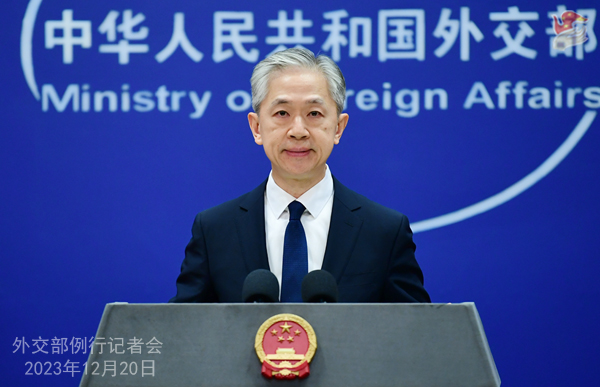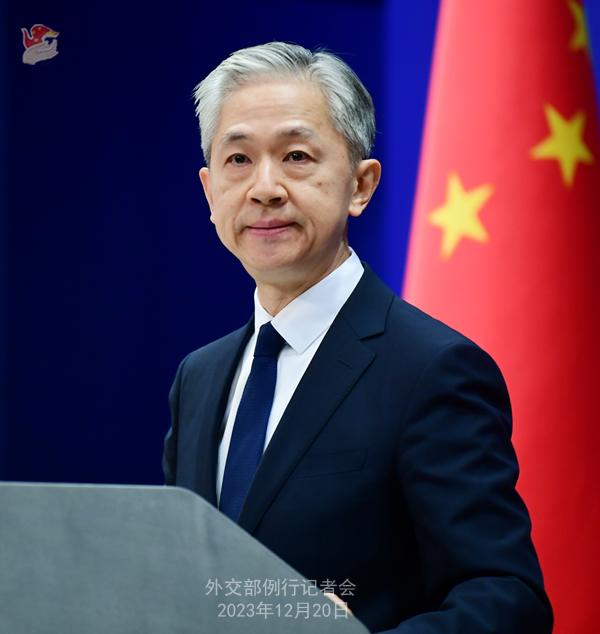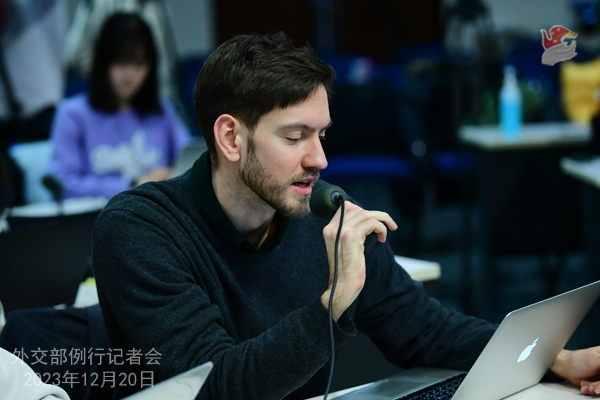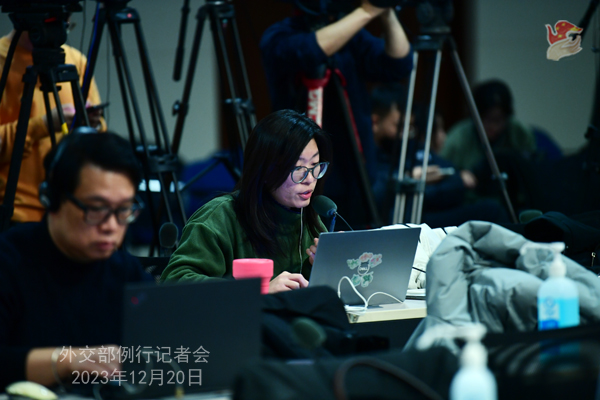| Foreign Ministry Spokesperson Wang Wenbin’s Regular Press Conference on December 20, 2023 |
| 2023-12-20 20:51 |
|
Shenzhen TV: China put forward the vision of jointly building a Green Silk Road years ago. Can you share with us how China has contributed to green development through Belt and Road cooperation and what experience has been gained through such cooperation? Wang Wenbin: The building of a Green Silk Road, an important part of high-quality Belt and Road cooperation, follows the global trend of green and low-carbon development, and provides experience and pathways for BRI partner countries in their effort to enhance environmental protection, tackle climate challenge and implement the UN 2030 Agenda for Sustainable Development. The cooperation has shown strong vibrancy. Over the past decade, China has issued policy documents on enhancing environmental management for overseas projects, promoting the green development of Belt and Road cooperation, enhancing international cooperation on green energy, and stopping building new coal-fired power projects overseas, and identified the priorities for the Green Silk Road. China has also worked with BRI partner countries to launch the Initiative for Belt and Road Partnership on Green Development, propose the Green Investment Principles for the BRI, and establish the BRI International Green Development Coalition as part of the effort to build platforms for extensive exchange and cooperation on green development and build up international consensus. By the end of last month, China has signed 48 South-South cooperation documents on climate change with 39 partner countries, rolled out over 70 climate mitigation and adaptation projects with more than 30 partner countries including Ethiopia, Pakistan, Samoa, Chile and Egypt, and set up a number of low-carbon demonstration zones. China also helped train over 10,000 environmental and climate professionals for more than 100 developing countries through projects such as the Green Silk Road Envoys Program. The vision and technology of green development have been integrated into a number of flagship projects, including the China-Europe Railway Express, Mombasa-Nairobi Railway, China-Laos Railway, Indonesia Tsingshan Industrial Park and Vientiane Saysettha Low-Carbon Demonstration Zone in Laos, providing a strong boost to energy saving, environmental protection and emission reduction, which has been widely commended by the people in relevant countries. Going forward, China will stay committed to the path of Chinese modernization featuring harmony between man and nature, work with BRI partner countries to make green a defining feature of high-quality development, aim for high standard, more benefits for the people and sustainable growth, elevate and expand green development cooperation, advance international cooperation in addressing climate change and together protect the planet we call home.
Reuters: Argentinean media reports that China has put on hold the USD 6.5 billion currency swap line arrangement between China and Argentina’s central banks. Could you confirm this? And if so, this was put on hold, why is that? Wang Wenbin: I’d refer you to competent authorities on that. I’d like to reiterate that China is committed to cooperation with Argentina on the basis of equality and mutual benefit. Global Times: China’s Permanent Representative to the UN Ambassador Zhang Jun submitted the instrument of ratification of the Firearms Protocol to the UN Secretary-General Antonio Guterres. It was reported earlier that China’s ratification of the Firearms Protocol will help China and other developing countries achieve substantial progress in firearms management cooperation. What’s China’s comment? Wang Wenbin: The Chinese government always puts our people and their lives above all else and has been emphasizing the multiple challenges that gun proliferation has brought to socioeconomic development of countries and to regional and international peace and stability. The ratification of the Firearms Protocol is yet another major step taken by China to implement the Global Security Initiative, practice multilateralism and uphold international and regional peace and stability. China is one of the safest countries with the lowest crime rate and the fewest gun and bomb attacks. As a permanent member of the UN Security Council and a responsible member of the international community, China is ready to use the ratification of the Firearms Protocol as an opportunity to strengthen exchanges and cooperation with all parties in the field of small arms and light weapons, with an emphasis on enhancing relevant capacity building of developing countries, and take concrete steps to practice the vision of building a community with a shared future for mankind. Bloomberg: Can you help clarify the situation in Myanmar? Just because China says a temporary ceasefire was agreed upon when the Myanmar junta and rebel groups met in China. But now rebel groups are saying that fighting is continuing. Can you give some clarity on the situation? Is there indeed a ceasefire? Wang Wenbin: This question has been asked yesterday, and we have made the response. I’d like to share with you more information. With China’s active mediation and continuous effort, relevant parties in Myanmar held peace talks in Kunming and signed a temporary ceasefire agreement. China hopes that relevant parties in Myanmar will effectively implement what has been agreed, exercise maximum restraint, actively ease the situation on the ground, properly manage sporadic confrontation events during ceasefire and maintain the momentum of ceasefire and peace talks. China will continue engaging parties concerned to help end the conflict and promote talks in northern Myanmar and jointly work for a soft landing of the situation in northern Myanmar.
TASS: Over the course of this year, Russian Prime Minister Mikhail Mishustin and Chinese Premier of the State Council Li Qiang have held three meetings. How does China view the communication between the leaders of the two countries this year? What is China’s expectation for dialogue with Russia next year? Wang Wenbin: You mentioned that Russian Prime Minister Mikhail Mishustin and Premier Li Qiang have met several times this year. Let me take this opportunity to share some details about the recent regular meeting between Chinese and Russian heads of government. This morning, President Xi Jinping met with Prime Minister Mishustin at the Great Hall of the People. President Xi noted that this year, he has met President Putin twice. The two countries have carried out close exchanges between the governments, legislatures, and political parties and at the sub-national level. Practical cooperation in various areas has experienced sound and steady development. Within the first 11 months of this year, bilateral trade already reached the annual trade target of USD 200 billion jointly set by President Xi and President Putin. This shows the enormous resilience and potential for the mutually beneficial cooperation between the two countries. To ensure the sound growth of China-Russia relations is a strategic choice made by both sides based on the fundamental interests of the two peoples. China supports the Russian people in following the development path they have chosen. China will work with Russia and take the 75th anniversary of diplomatic ties next year as a new starting point to magnify the positive effect of our high-level political relations and continue supporting each other in economic and social development and national revitalization. President Xi Jinping stressed that the Chinese economy’s strong resilience, ample potential, broad maneuver space and the fundamentals sustaining China’s sound economic growth in the long run stay unchanged. China’s commitment to high-quality development and high-level opening up will create new opportunities for the development of all countries, including Russia. The two sides need to fully leverage the strengths of political mutual trust, economic complementarity, infrastructure connectivity and people-to-people bond, add new dimensions to cooperation, deepen cooperation in areas of economy, trade, energy and infrastructure, and jointly safeguard the security and stability of the industrial and supply chains. The two sides need to work for the success of the China-Russia Years of Culture in the next two years by designing and carrying out a variety of cultural exchange events, so as to consolidate the social and public foundation for the ever-lasting friendship between the two countries. Yesterday, Premier Li Qiang and Prime Minister Mishustin co-chaired the 28th regular meeting between Chinese and Russian heads of government. Premier Li Qiang noted that under the strategic guidance of President Xi Jinping and President Putin, China-Russia relations have enjoyed robust growth with stronger political mutual trust, deepened people-to-people friendship, more resilient practical cooperation and closer coordination on international affairs, which provides an example of a new type of major-country relations. China stands ready to work with Russia to take the 75th anniversary of diplomatic ties next year as an opportunity to deliver on the important common understandings of the two presidents, carry forward the ever-lasting friendship, work for new, greater progress in bilateral relations, improve the wellbeing of the two peoples and contribute more stability and positive energy to the world. The two heads of government heard the work reports from the two sides’ representatives of the China-Russia investment cooperation committee, the China-Russia energy cooperation committee, the committee for the regular meetings between Chinese and Russian heads of government, the intergovernmental commission for cooperation of Northeast China and the Far East and Baikal region of Russia, and the China-Russia committee on humanities cooperation. The two heads of government fully recognized the efficient and practical work of the committees over the past year. The two sides agreed that as China and Russia are committed to development and revitalization, the two sides can build up inner driving forces for the growth of bilateral relations by expanding trade and agricultural cooperation, creating a better investment environment for each other’s companies, jointly safeguarding energy security, improving connectivity, enhancing people-to-people exchange and sub-national cooperation, and ensuring the security and stability of the industrial and supply chains. The two heads of government announced the successful conclusion of the 2022-2023 Years of Sports Exchanges and expressed the desire to make the 2024-2025 Years of Culture a great success. I would also like to add that China and Russia are each other’s largest neighbors and comprehensive strategic partners of coordination for a new era. Both countries are permanent members of the UN Security Council and major emerging markets. We enjoy complete mechanisms of high-level exchange and leaders of the two countries maintain close communication. These are an integral part of the sound and steady growth of China-Russia relations. Next year marks the 75th anniversary of diplomatic ties between China and Russia and will open the China-Russia Years of Culture. We hope that the two countries will deepen bilateral cooperation on the basis of mutual respect and mutual benefit through dialogue and communication, and enhance people-to-people and sub-national exchanges for greater benefits to the two countries and the two peoples. AFP: You just briefed us on Prime Minister Mishustin’s visit to China. Did the two sides talk about Russia’s invasion of Ukraine? Wang Wenbin: China has released the readouts on the regular meeting between Chinese and Russian heads of government. You may refer to that.
CCTV: It’s been reported that after a magnitude-6.2 earthquake struck Jishishan County of Linxia Prefecture, Gansu Province on December 18, leaders of many countries and international organizations have expressed sympathies to China. Can you give us some details? Wang Wenbin: Following the earthquake in Jishishan County of Linxia Prefecture, Gansu Province, leaders of various countries, including Russian President Vladimir Putin, King of Cambodia Norodom Sihamoni, Pakistani President Arif Alvi, Maldives’ President Mohamed Muizzu, ROK President Yoon Suk-yeol, UAE President Sheikh Mohamed bin Zayed Al Nahyan, President of the Central African Republic Faustin-Archange Touadéra, Belorussian President Aleksandr Lukashenko, Kazakhstan’s President Kassym-Jomart Tokayev, Turkmenistan’s President Serdar Berdimuhamedov, Uzbekistan’s President Shavkat Mirziyoyev, Tajikistan’s President Emomali Rahmon, German President Frank-Walter Steinmeier, Italian President Sergio Mattarella, Serbian President Aleksandar Vucic, the three members of the Presidency of Bosnia and Herzegovina, Hungarian President Katalin Novák, Nicaragua’s President Daniel Ortega, Bangladesh’s Prime Minister Sheikh Hasina, and Japanese Prime Minister Fumio Kishida, have sent messages or letters to express deep sympathies to President Xi Jinping and condolences over the victims of the earthquake. Other leaders from various countries and international organizations, including Russian Prime Minister Mikhail Mishustin, Chairman of the State Duma of Russia Vyacheslav Volodin, Pakistani Prime Minister Anwaar-ul-Haq Kakar, Chairman of the Senate of Pakistan Muhammad Sadiq Sanjrani, Speaker of the National Assembly of Pakistan Raja Pervez Ashraf, Thailand’s Prime Minister Srettha Thavisin, Vice President of the Maldives Hussain Mohamed Latheef, Chairman of the People’s Council of Turkmenistan Gurbanguly Berdymukhammedov, Uzbekistan’s Prime Minister Abdulla Aripov, Serbian First Deputy Prime Minister and Minister of Foreign Affairs Ivica Dacic, New Zealand’s Deputy Prime Minister and Foreign Minister Winston Peters, Dominican Prime Minister Roosevelt Skerrit, Prime Minister of Grenada Dickon Mitchell, Venezuelan Vice President Delcy Rodriguez, UN Secretary-General António Guterres and President of the 78th session of the UN General Assembly Dennis Francis, also extended sympathies to China through messages and other means. Countries such as Afghanistan, Nepal, Egypt, Saudi Arabia, Israel, Türkiye, Jordan, Libya, Morocco, Tunisia, Ethiopia, Kyrgyzstan, Armenia, Azerbaijan, Moldova, France, Switzerland, Denmark, Finland, the Netherlands, Belgium, the Czech Republic, Estonia, Latvia, Cyprus, the US, Australia, Canada, Cuba, Brazil, Colombia, El Salvador, Mexico, Ecuador, Argentina, Uruguay, Peru and Chile have expressed sympathies to China by various means. We would like to express our heartfelt appreciation for their well wishes. After the earthquake, General Secretary Xi Jinping made important instructions, asking for all-out search and rescue, timely treatment of the injured, effort to properly look after those hit by the disaster, and every possible effort to protect the safety of lives and property. Premier Li Qiang gave instructions for all-out rescue and relief efforts. Yesterday, Vice Premier Zhang Guoqing urgently led a working group from the State Council to the region hit by the earthquake to guide the relief work. As we speak, various rescue and relief teams are working around the clock to respond to the disaster. Disaster relief materials, such as cotton tents, folding beds, quilts and winter coats are being sent to the region without delay. All work is proceeding in a timely and orderly manner. We believe that under the strong leadership of the CPC Central Committee and with the strong support from various sectors across China, the people in the quake area will overcome the disaster and rebuild their homes.
|
 | ||||||||||||
 | ||||||||||||
|




